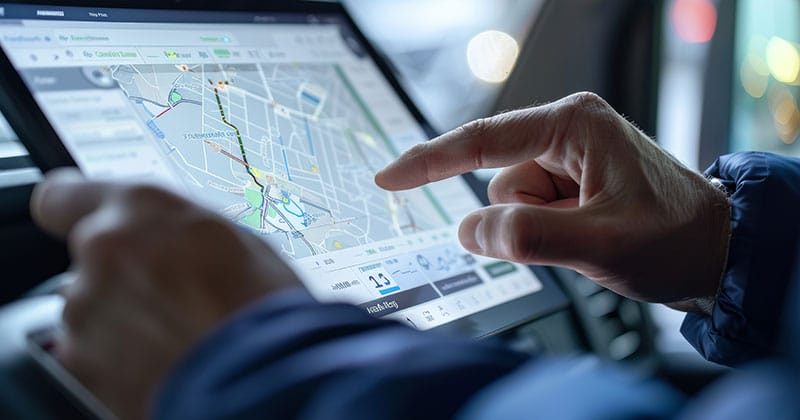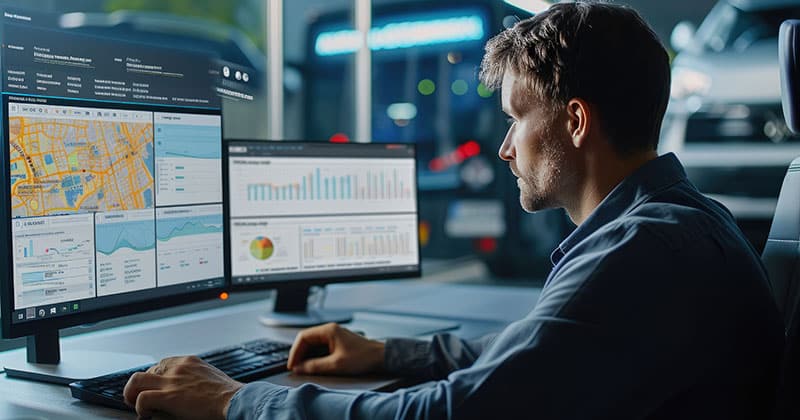
Managing a fleet of vehicles requires accuracy, responsibility, and efficiency. That’s where commercial GPS fleet tracking devices come in.
Fleet management software that uses GPS tracking has many benefits for businesses. It allows you to track vehicles in real time, plan better routes, improve driver behavior, and more.
In this article, we’ll explain GPS fleet tracking devices and examine their benefits. We’ll also review key features to look for and discuss how these systems can integrate with field service software to work even better.
By the end, you’ll have a clear understanding of how to pick and use a GPS-tracking solution that fits your business.
Let’s dive in!
What Are Commercial GPS Fleet Tracking Devices?
Commercial GPS fleet tracking devices use Global Positioning System (GPS) technology. They’re installed in vehicles and connected to cloud-based software. This enables vehicle owners to monitor and manage a fleet in real time.
The ability to constantly oversee your fleet has plenty of advantages. You’ll be able to track vehicle locations and monitor routes. You can even assess driver behavior to ensure safe and efficient driving. The result is often a significant improvement in overall business operations.
Fleet tracking devices go beyond just monitoring vehicle location, though. They also offer valuable business insights. This can include information about fuel consumption, vehicle maintenance needs, and driver performance.
With this technology, field service companies can reduce fuel costs and optimize job routing and road safety.
RELATED ARTICLE: What Is GPS Fleet Tracking for Field Service Management?

How GPS Fleet Tracking Devices Benefit Businesses
So now, we understand the basics of how GPS fleet tracking devices work. Next, let’s get into the specific ways they can benefit businesses.
Here are some important ways GPS tracking can enhance and streamline fleet management:
1. Increased Accountability
With GPS tracking devices, managers can always see where their vehicles are.
This keeps drivers on task and helps reduce unauthorized stops or long idle times. It also encourages them to follow company policies and stick to planned routes.
Better accountability leads to more efficient operations and improved productivity.
2. Understand and Improve Driver Behavior
Research has shown that aggressive driving can lower fuel economy by up to 40%. That’s a lot of potential savings on fuel and costs.
GPS devices track drivers’ performance, including speeding, harsh braking, and long idle times. This information helps managers coach drivers in safer, more efficient driving.
Addressing these behaviors with drivers early can improve fuel efficiency across your fleet. Additionally, it can reduce accident risks and lower insurance premiums.
3. Route Optimization
GPS tracking is crucial for finding the best routes to and between jobs. Optimizing routes helps businesses cut down on fuel costs and travel time. Plus, real-time adjustments can be made for traffic or other delays.
This is especially valuable for delivery and service companies. Every minute saved on the road means happier customers and lower costs.
4. Fuel Savings
Fuel is a significant expense for fleet businesses, but GPS tracking can help reduce it. How? By monitoring fuel use, idle time, and driving routes.
In fact, on average, 36% of businesses using fleet tracking have lowered their fuel costs. This has primarily been accomplished through optimizing routes and reducing idle time.
5. Theft Prevention
Another notable benefit of GPS tracking devices for businesses is theft protection. If a vehicle is stolen, managers can track it in real time and provide its exact location to law enforcement.
Geofencing technology can also alert managers if a vehicle leaves a designated area. This type of early detection can help prevent theft before it happens. It also increases the chances of the equipment being recovered.
6. Improved Customer Service
GPS tracking devices aren’t just advantageous for your business. Their benefits trickle down to your customers, too.
GPS tracking helps businesses inform customers about delivery times or service windows. With live location updates, customers will know when to expect their deliveries or technicians. The resulting transparency and convenience will lead to greater customer satisfaction.
Additionally, live updates about technician arrivals will help minimize missed appointments.
7. Maintenance Alerts
Some GPS systems can send maintenance alerts as part of vehicle monitoring. And as fleet managers surely know, keeping track of vehicle maintenance is crucial.
Regular maintenance helps keep vehicles running smoothly, prevents costly repairs, and reduces downtime.

How Commercial GPS Fleet Devices Benefit Different Industries
Before you invest in commercial GPS tracking, you may wonder if it’s a good fit for your specific industry. The good news is that these systems can be adapted to address a wide variety of business challenges.
Let’s take a look at a few examples:
- Delivery and Logistics. With GPS tracking, dispatchers can reroute drivers around traffic and provide accurate delivery windows. This helps reduce delays and improve customer satisfaction.
- Construction. Construction companies often use GPS tracking to prevent theft and unauthorized equipment use. Geofencing alerts can notify managers when equipment moves outside designated work areas.
- HVAC and Plumbing Services: GPS plays an integral role in HVAC, plumbing, and other field service industries. Vehicle tracking helps companies assign the nearest available technician to each job. This helps reduce travel time and improve response rates. Optimized scheduling also allows companies to handle more service calls.
- Waste Management. Fleet tracking helps waste management companies reduce idle time and save on fuel. By following assigned routes, drivers improve efficiency and cut down on emissions.
- Public Transportation and Shuttle Services. GPS tracking allows riders to check bus or shuttle locations in real time. Access to more accurate and updated route information provides a better passenger experience. It also helps ensure that drivers stick to schedules and routes.
- Healthcare and Emergency Services. GPS fleet tracking is crucial for ambulances and emergency response vehicles. It helps identify the fastest routes, reducing response times and potentially saving lives. Real-time tracking also helps dispatchers allocate resources more effectively during emergencies.
- Agriculture. Farmers use commercial GPS to track the location and usage of their machinery. This helps optimize field operations, reduce fuel consumption, and prevent equipment theft. It also aids in planning and executing agricultural tasks more efficiently.
RELATED ARTICLE: How to Track Fleet Vehicles for Home Service Businesses
Key Features to Look for in GPS Tracking Devices
Although commercial GPS tracking devices all function similarly, there are differences between systems. So, if you’re shopping for one for your business, knowing what to look for is important.
Understanding the essential features you need will ensure enhanced fleet performance and efficiency. It’ll also save you time, money, and effort in your search.
Let’s review some key features to consider when choosing a GPS tracking system for your fleet.
1. Real-Time Tracking
One of the most critical features of a GPS tracking device is real-time tracking. This allows you to see exactly where your vehicles are at any given moment. It provides up-to-the-minute information on location, speed, and route progress.
Real-time tracking ensures that fleet managers can respond quickly to issues.
For example, rerouting during traffic delays or promptly addressing vehicle breakdowns. It also allows businesses to provide customers with accurate delivery windows
2. Geofencing
Geofencing creates virtual boundaries around a specific area. For businesses, that area may be a worksite or delivery zone. When a vehicle crosses these boundaries, the system sends an alert to the fleet manager.
Geofencing alerts have many uses. They can help monitor deliveries, ensure vehicles stay within designated areas, and prevent theft.
Geofencing is especially valuable for industries like construction. When working with such expensive machinery, keeping track of it is crucial to security.
3. Driver Behavior Monitoring
A commercial GPS tracking system can help fleet managers supervise driver behavior. Tracking habits like speeding, braking, rapid acceleration, and idle time is made easy.
When managers are aware of risky driver behavior, they can coach their teams. Training on better driving practices improves both safety and fuel efficiency. Plus, safer driving often means lower insurance premiums, too.
In fact, fleets using GPS systems have seen significant progress in driving behavior. This includes a 75% decrease in harsh braking incidents and a 20% reduction in safety incidents.

4. Maintenance Alerts
Along with monitoring drivers, GPS tracking devices can also monitor vehicle health. When maintenance is required, the system sends an alert. So, if one of your vehicles needs an oil change or brake inspection, you can stay on top of it.
Maintenance alerts prevent costly breakdowns and extend the lifespan of the vehicles. They also help reduce downtime and save on long-term repair costs.
5. Route Optimization
One of the most valuable ways to leverage GPS tracking is for route optimization.
Route optimization features help businesses plan the most efficient routes for their vehicles. For example, your system may identify areas of traffic congestion or accidents. Then, you can redirect drivers to the quickest path, saving time and fuel.
Real-time adjustments to routes can also be made if road conditions change. So, even if a driver is already on their way, you can reroute them and keep your fleet moving smoothly and on time.
Route optimization can significantly increase the number of appointments completed in a day. That means more jobs, revenue, and satisfied customers for your business.
6. Fuel Usage Monitoring
Monitoring fuel consumption is essential for businesses looking to cut costs. A GPS tracking system that tracks fuel usage allows fleet managers to see where fuel is being wasted. This may be through long idle times, inefficient routes, or poor driving behavior.
By identifying these inefficiencies, businesses can make changes to lower fuel expenses. Reduced fuel usage also makes your fleet more environmentally friendly.
7. Integration with Field Service Software
Field service management software is the crux of many service-based companies. When choosing a GPS system, it’s important to ensure it can integrate with that software.
Fortunately, it’s usually easy to feed GPS device data into existing systems. Businesses can then track vehicle locations, optimize routes, and generate reports—all in one place.
This level of integration makes fleet management more seamless. It also reduces the need for manual tracking or data entry (more on that in a second).
RELATED ARTICLE: Fleet Management Basics for Field Service Companies

Integrating GPS Fleet Tracking into Field Service Software
When all your business’s systems work together, it’s much easier to get every task done. That’s why integrating GPS tracking with your management software makes such a difference. It’ll help you be more productive, get things done faster, and keep operations simple.
Here’s how:
Harnessing GPS Data for Centralized Management
Integrated GPS tracking makes it easier for managers to supervise their fleets. You only need to log into one platform to see all your important fleet and job data in one place.
For example, software like, software like Service Fusion connects with your GPS system to input the data directly into your account. From there, you can access real-time updates on vehicle locations, driver behavior, and job statuses.
Improved Job Scheduling and Dispatching
Real-time vehicle location data is also valuable for company dispatchers. They can use this information to match jobs with the closest available driver.
The result? Faster response times, reduced fuel costs, and minimized customer wait times.
Real-time tracking also allows dispatchers to adjust schedules on the fly. This ensures that last-minute changes or urgent calls can be handled without disruption.
Enhanced Route Management for More Efficient Operations
Another benefit of GPS tracking and field service software that work together is dynamic route management.
With real-time GPS data, drivers can avoid traffic, road closures, or other delays. And with fewer delays, more jobs can be completed per day.
Service-based companies, in particular, benefit from being able to reroute drivers quickly. Rerouting helps ensure that service windows are met, boosting overall customer satisfaction.
Automated Reporting and Actionable Insights
When it comes to reporting and analytics, GPS data integration makes things simpler.
Vehicle data is recorded automatically, making it easy for managers to access it. They’ll be able to see information like mileage, fuel consumption, and job completion times all in your management software.
These insights are valuable for businesses looking to refine their work processes. They allow you to monitor trends, track performance, and identify areas for improvement.
Top Takeaways for Commercial GPS Fleet Tracking Devices
Are you ready to experience the power of GPS fleet tracking at your business? Here are a few tips to keep in mind as you get started:
- Start with a Pilot Program: Try using your new GPS tracking system on a small scale before employing it fleet-wide. This gives you a chance to understand its benefits and challenges before a full rollout.
- Train Your Team: Take the time to train drivers and managers on the best practices for using the GPS tracking system.
- Monitor and Adjust: Regularly reviewing the GPS tracking system data helps you make the most of it. It will allow you to adjust routes, address driver behavior, and plan maintenance as needed.
- Communicate with Drivers: Keep an open line of communication with your drivers to address any concerns or feedback they may have about the GPS tracking system.
- Integrate with Field Service Software: Link GPS data with field service software like Service Fusion to maximize efficiency. This makes it easy to manage routes, schedules, and reports from one place.
Related Posts
Stay Informed
Get the latest news and insights plus, Service Fusion offers and updates.Thank you for your submission.
SHARE